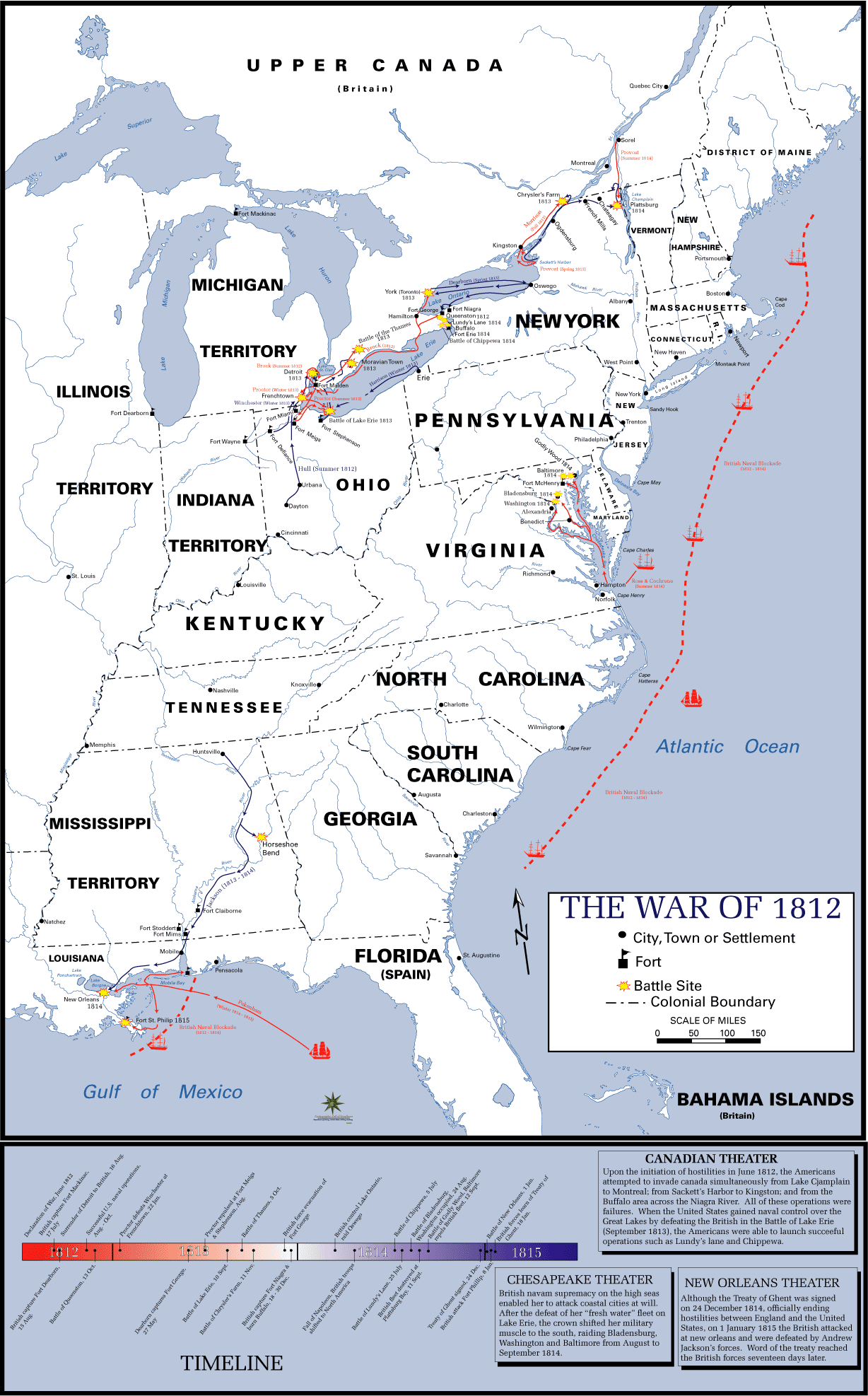War Of 1812: Key Events Explained

The War of 1812, a conflict that lasted from 1812 to 1815, was a pivotal moment in American and British history. The war was fought between the United States and the British Empire, with the U.S. declaring war on June 18, 1812. The conflict had its roots in various factors, including British impressment of American sailors, trade restrictions, and British support for Native American resistance against American expansion. To understand the complexities of this war, it is essential to examine the key events that led to its outbreak, its progression, and its eventual conclusion.
Naturally worded primary topic section with semantic relevance

The War of 1812 can be divided into several key phases, each marked by significant events and battles. The first phase, which lasted from 1812 to 1813, saw the U.S. launch a series of attacks against British Canada. The American strategy was to quickly capture key Canadian cities and use them as bargaining chips to negotiate a peace treaty. However, the U.S. suffered a series of defeats, including the surrender of Detroit and the failure to capture Montreal. These early setbacks were largely due to a combination of inadequate planning, insufficient training of the militia, and the strength of British defenses.
Specific subtopic with natural language phrasing
One of the most significant events of the war was the burning of Washington, D.C. by British troops in August 1814. Following the American defeat at the Battle of Bladensburg, British forces marched into Washington, where they set fire to several buildings, including the White House, the Capitol, and other government structures. This act was seen as a retaliation for the American burning of York (now Toronto) earlier in the war. The event was a significant blow to American morale and led to widespread outrage and calls for revenge.| Relevant Category | Substantive Data |
|---|---|
| British Casualties at New Orleans | Over 2,000 soldiers killed, wounded, or missing |
| American Casualties at New Orleans | 71 soldiers killed, 108 wounded, and 51 missing |
| Treaty of Ghent Signing Date | December 24, 1814 |

Key Points
- The War of 1812 was fought between the United States and the British Empire from 1812 to 1815.
- The conflict had its roots in British impressment of American sailors, trade restrictions, and British support for Native American resistance.
- The U.S. suffered early defeats, including the surrender of Detroit and the failure to capture Montreal.
- The burning of Washington, D.C. by British troops in August 1814 was a significant blow to American morale.
- The Treaty of Ghent, signed on December 24, 1814, officially ended the War of 1812.
The war’s impact on the United States was profound, leading to significant changes in the country’s military, economy, and foreign policy. The U.S. military emerged from the war with a newfound sense of professionalism and a recognition of the need for a stronger, more centralized military. The war also stimulated American industry, particularly in the North, as the government invested in infrastructure and manufacturing to support the war effort. Furthermore, the war marked a turning point in U.S.-British relations, as the two countries began to develop a more cooperative and less confrontational relationship.
In terms of foreign policy, the War of 1812 led to a significant shift in American attitudes towards expansion and international relations. The U.S. began to assert its claims to territory in North America more aggressively, setting the stage for the country’s westward expansion in the decades that followed. The war also marked the beginning of a long period of British-American cooperation, as the two countries worked together to resolve border disputes and promote trade.
The legacy of the War of 1812 continues to be felt today, with many historians regarding it as a defining moment in American history. The war’s impact on American identity, politics, and foreign policy was profound, and its effects can still be seen in the country’s relationships with its neighbors, its military posture, and its approach to international relations.
What were the main causes of the War of 1812?
+The main causes of the War of 1812 were British impressment of American sailors, trade restrictions, and British support for Native American resistance against American expansion.
What was the significance of the Battle of New Orleans?
+The Battle of New Orleans was a significant American victory that took place after the Treaty of Ghent had been signed, marking a turning point in the war's legacy and boosting American morale.
How did the War of 1812 impact American industry and economy?
+The War of 1812 stimulated American industry, particularly in the North, as the government invested in infrastructure and manufacturing to support the war effort, leading to significant economic growth and development.
What was the Treaty of Ghent, and what did it accomplish?
+The Treaty of Ghent was a peace treaty signed on December 24, 1814, that officially ended the War of 1812, restoring relations between the U.S. and Britain to what they were before the war, with no significant territorial changes.
How did the War of 1812 influence American foreign policy and relations with Britain?
+The War of 1812 marked a turning point in U.S.-British relations, leading to a more cooperative and less confrontational relationship, and influencing American foreign policy, as the U.S. began to assert its claims to territory in North America more aggressively.
In conclusion, the War of 1812 was a complex and multifaceted conflict that had significant impacts on American history, identity, and foreign policy. Understanding the key events and battles of the war, as well as its causes and consequences, is essential for grasping the nuances of American development and the country’s place in the world. As the U.S. continues to evolve and grow, the lessons of the War of 1812 remain relevant, offering insights into the importance of diplomacy, the role of military power, and the complexities of international relations.



